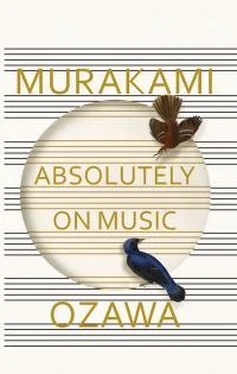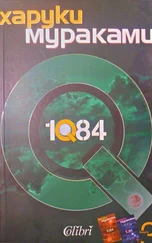Contents
Cover
About the Book
About the Author
Also by Haruki Murakami
Title Page
Introduction
My Afternoons with Seiji Ozawa
First Conversation
Mostly on the Beethoven Third Piano Concerto
INTERLUDE 1 On Manic Record Collectors
Second Conversation
Brahms at Carnegie Hall
INTERLUDE 2 The Relationship of Writing to Music
Third Conversation
What Happened in the 1960s
INTERLUDE 3 Eugene Ormandy’s Baton
Fourth Conversation
On the Music of Gustav Mahler
INTERLUDE 4 From Chicago Blues to Shin’ichi Mori
Fifth Conversation
The Joys of Opera
In a Little Swiss Town
Sixth Conversation
“There’s No Single Way to Teach. You Make It Up as You Go Along.”
Afterword by Seiji Ozawa
Copyright
ABOUT THE BOOK
An intimate conversation about music and creativity, between the internationally bestselling writer and a world-class conductor.
‘My only purpose in this book was for me, as a music lover, to have a discussion of music with the musician Seiji Ozawa that was as open and honest as possible. I simply wanted to bring out the ways that each of us (though on vastly different levels) is dedicated to music.’
Haruki Murakami’s passion for music runs deep. Before turning his hand to writing, he ran a jazz club in Tokyo, and the aesthetic and emotional power of music permeates every one of his much-loved books. Now, in Absolutely on Music , Murakami fulfills a personal dream, sitting down with his friend, acclaimed conductor Seiji Ozawa, to talk about their shared interest.
Transcribed from lengthy conversations about the nature of music and writing, here they discuss everything from Brahms to Beethoven, from Leonard Bernstein to Glenn Gould, from record collecting to pop-up orchestras, and much more. Ultimately this book gives readers an unprecedented glimpse into the minds of two maestros.
ABOUT THE AUTHOR
Haruki Murakami is the author of many novels as well as short stories and non-fiction. His books include Norwegian Wood, The Wind-Up Bird Chronicle, Kafka on the Shore, 1Q84, What I Talk About When I Talk About Running, Colorless Tsukuru Tazaki and His Years of Pilgrimage, The Strange Library and Wind/Pinball . His work has been translated into more than 50 languages, and the most recent of his many international honours is the Jerusalem Prize.
Seiji Ozawa served as music director of the Boston Symphony Orchestra for twenty-nine years, and was music director of the Toronto Symphony Orchestra, the San Francisco Symphony, the Chicago Symphony Orchestra’s Ravinia Festival, and Wiener Staatsoper. With Kazuyoshi Akiyama, he formed the Saito Kinen Orchestra and is the director of the Seiji Ozawa Matsumoto Festival. Ozawa has been deeply involved in musical education through his work with Tanglewood Music Center Orchestra, the Ozawa International Chamber Music Academy Okushiga, Seiji Ozawa International Academy Switzerland and as founder of the Seiji Ozawa Music Academy Opera Project, organizations which provide opportunities to outstanding students in Asia and Europe. Among his many honours, Ozawa has been awarded the Officier de la Légion d’Honneur in France, the Japanese Order of Culture, the Kennedy Center Honors, and a Grammy Award for Best Opera Recording.
ALSO BY HARUKI MURAKAMI
FICTION
After Dark
After the Quake
Blind Willow, Sleeping Woman
Colorless Tsukuru Tazaki and His Years of Pilgrimage
Dance Dance Dance
The Elephant Vanishes
Hard-Boiled Wonderland and the End of the World
Kafka on the Shore
Norwegian Wood
South of the Border, West of the Sun
Sputnik Sweetheart
The Strange Library
A Wild Sheep Chase
Wind/Pinball
The Wind-Up Bird Chronicle
1Q84
NON-FICTION
Underground: The Tokyo Gas Attack and the Japanese Psyche
What I Talk About When I Talk About Running
Absolutely on Music
Conversations with Seiji Ozawa
Haruki Murakami
Translated from the Japanese by Jay Rubin
Introduction
My Afternoons with Seiji Ozawa
Until we started the interviews in this book, I had never had a serious conversation with Seiji Ozawa about music. True, I lived in Boston from 1993 to 1995, while he was still music director of the Boston Symphony Orchestra, and I would often go to concerts he conducted, but I was just another anonymous fan in the audience. Not long after that, my wife and I happened to become friends with his daughter, Seira, and we would see and talk to her father now and then. But our acquaintance was casual and had nothing to do with either his work or mine.
Perhaps one reason we never talked seriously about music until recently is that the maestro’s work kept him so fully involved. As a result, whenever we got together to have a drink, we’d talk about anything other than music. At most, we might have shared a few fragmentary remarks on some musical topics that never led anywhere. Ozawa is the type of person who focuses all his energy on his work, so that when he steps away from it, he needs to take a breather. Knowing this, I avoided bringing up musical topics when I was in his company.
In December of 2009, however, Ozawa was found to have esophageal cancer, and after major surgery the following month, he had to restrict his musical activities, largely replacing them with a challenging program of recuperation and rehabilitation. Perhaps because of this regime, we gradually began to talk more about music whenever we met. As weakened as he was, he took on a new vitality whenever the topic turned to music. Even when talking with a musical layman such as myself, any sort of conversation about music seemed to provide the refreshment he needed. And the very fact that I was not in his field probably set him at ease.
I have been a fervent jazz fan for close to half a century, but I have also been listening to classical music with no less enjoyment, collecting classical records since I was in high school, and going to concerts as often as time would permit. Especially when I was living in Europe—from 1986 to 1989—I was immersed in classical music. Listening to jazz and the classics has always been both an effective stimulus and a source of peace to my heart and mind. If someone told me that I could listen to only one or the other but not to both, my life would be immeasurably diminished. As Duke Ellington once said, “There are simply two kinds of music, good music and the other kind.” In that sense, jazz and classical music are fundamentally the same. The pure joy one experiences listening to “good” music transcends questions of genre.
During one of Seiji Ozawa’s visits to my home, we were listening to music and talking about one thing or another when he told me a tremendously interesting story about Glenn Gould and Leonard Bernstein’s 1962 performance in New York of Brahms’s First Piano Concerto. “What a shame it would be to let such a fascinating story just evaporate,” I thought. “Somebody ought to record it and put it on paper.” And, brazen as it may seem, the only “somebody” that happened to cross my mind at the moment was me.
When I suggested this to Seiji Ozawa, he liked the idea immediately. “Why not?” he said. “I’ve got plenty of time to spare these days. Let’s do it.” To have Seiji Ozawa ill with cancer was a heart-wrenching development for the music world, for me personally, and of course for him; but that it gave rise to this time for the two of us to sit and have good, long talks about music may be one of those rare silver linings that are not in fact to be found in every cloud.
Читать дальше











